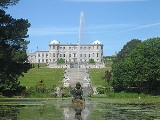
Buildings inspired by Versailles
Encyclopedia
This is a list of Baroque
palaces built in Europe in the late 17th and 18th centuries. Some of them were inspired by the construction of the Palace of Versailles
by Louis XIV and its successive extensions. Versailles was a source of inspiration for the monarchs and nobles of Europe who also longed for a residence appropriate to their privileged position.
Only the most important city residences, such as the Stockholm Palace
and Winter Palace
, are included.
Pre-Versailles Roman palazzi, such as Palazzo Barberini
, Palazzo Chigi-Odescalchi, Palazzo Ludovisi
, Palazzo Colonna
, Palazzo Altieri
, Palazzo Muti Papazzurri
, Palazzo di Propaganda Fide
, etc. are excluded from this list.
Only a few Lustschlösser
, Jagdschlösser
, and "porcelain palaces" with Rococo
interiors are shown; these entries are colored lavender.
Baroque architecture
Baroque architecture is a term used to describe the building style of the Baroque era, begun in late sixteenth century Italy, that took the Roman vocabulary of Renaissance architecture and used it in a new rhetorical and theatrical fashion, often to express the triumph of the Catholic Church and...
palaces built in Europe in the late 17th and 18th centuries. Some of them were inspired by the construction of the Palace of Versailles
Palace of Versailles
The Palace of Versailles , or simply Versailles, is a royal château in Versailles in the Île-de-France region of France. In French it is the Château de Versailles....
by Louis XIV and its successive extensions. Versailles was a source of inspiration for the monarchs and nobles of Europe who also longed for a residence appropriate to their privileged position.
Only the most important city residences, such as the Stockholm Palace
Stockholm Palace
The Stockholm Palace is the official residence and major royal palace of the Swedish monarch. . Stockholm Palace is located on Stadsholmen , in Gamla Stan in the capital, Stockholm...
and Winter Palace
Winter Palace
The Winter Palace in Saint Petersburg, Russia, was, from 1732 to 1917, the official residence of the Russian monarchs. Situated between the Palace Embankment and the Palace Square, adjacent to the site of Peter the Great's original Winter Palace, the present and fourth Winter Palace was built and...
, are included.
Pre-Versailles Roman palazzi, such as Palazzo Barberini
Palazzo Barberini
Palazzo Barberini is a palace in Rome, facing the piazza of the same name in Rione Trevi and is home to the Galleria Nazionale d'Arte Antica.-History:...
, Palazzo Chigi-Odescalchi, Palazzo Ludovisi
Palazzo Montecitorio
The Palazzo Montecitorio is a palace in Rome and the seat of the Italian Chamber of Deputies.- History :The building was originally designed by Gian Lorenzo Bernini for the young Cardinal Ludovico Ludovisi, nephew of Pope Gregory XV...
, Palazzo Colonna
Palazzo Colonna
The Palazzo Colonna is a palatial block of buildings in central Rome, Italy, at the base of the Quirinal Hill, and adjacent to the church of Santi Apostoli...
, Palazzo Altieri
Palazzo Altieri
thumb|300 px|The Palazzo AltieriPalazzo Altieri is a palace in Rome, which was the home of the Altieri family in the city. The palace faces the square in front of the Church of the Gesù.-The Altieri:...
, Palazzo Muti Papazzurri
Palazzo Muti Papazzurri
This palazzo should not be confused with the Palazzo Muti e Santuario della Madonna dell' ArchettoPalazzo Muti Papazzurri is a Baroque palazzo in Rome. It was built in 1660 by the architect Mattia de' Rossi, a pupil of Gian Lorenzo Bernini....
, Palazzo di Propaganda Fide
Palazzo di Propaganda Fide
The Palazzo di Propaganda Fide is a palace located in Rome, designed by Gian Lorenzo Bernini, then Francesco Borromini...
, etc. are excluded from this list.
Only a few Lustschlösser
Lustschloss
A Lustschloss is a small palace which served the private pleasure of its owner, usually the ruler of the area. It is located in, and was inhabited for court, ceremonial, and state duties.A Lustschloss is often coupled with a Jagdschloss...
, Jagdschlösser
Jagdschloss
A Jagdschloss is a palace or a castle in a zoo or a hunting zone such as a forest, field or lake and served primarily as the accommodation for a ruler, and the court, on the occasion of the hunt in the area....
, and "porcelain palaces" with Rococo
Rococo
Rococo , also referred to as "Late Baroque", is an 18th-century style which developed as Baroque artists gave up their symmetry and became increasingly ornate, florid, and playful...
interiors are shown; these entries are colored lavender.
France
| Image | Name | Location | First owner |
|---|---|---|---|
| Château de Maisons Château de Maisons The Château de Maisons , designed by François Mansart from 1630 to 1651, is a prime example of French baroque architecture and a reference point in the history of French architecture... |
Maisons-Laffitte Maisons-Laffitte Maisons-Laffitte is a commune in the Yvelines department in the Île-de-France region in north-central France. It is located in the north-western suburbs of Paris from the center.... , Yvelines Yvelines Yvelines is a French department in the region of Île-de-France.-History:Yvelines was created from the western part of the defunct department of Seine-et-Oise on 1 January 1968 in accordance with a law passed on 10 January 1964 and a décret d'application from 26 February 1965.It gained the... |
René de Longueil René de Longueil thumb|René de Longueil, marquis de Maisons , le président de Maisons, was Surintendant des Finances under Louis XIII. He built the Château de Maisons.... |
|
| Château de Vaux-le-Vicomte Vaux-le-Vicomte The Château de Vaux-le-Vicomte is a baroque French château located in Maincy, near Melun, 55 km southeast of Paris in the Seine-et-Marne département of France... |
Maincy Maincy Maincy is a commune in the Seine-et-Marne department in the Île-de-France region in north-central France.The chateau of Vaux-le-Vicomte is located in the commune.-External links:* * * *... , Seine-et-Marne Seine-et-Marne Seine-et-Marne is a French department, named after the Seine and Marne rivers, and located in the Île-de-France region.- History:Seine-et-Marne is one of the original 83 departments, created on March 4, 1790 during the French Revolution in application of the law of December 22, 1789... |
Nicolas Fouquet Nicolas Fouquet Nicolas Fouquet, marquis de Belle-Île, vicomte de Melun et Vaux was the Superintendent of Finances in France from 1653 until 1661 under King Louis XIV... |
|
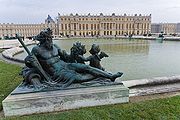 |
Palace of Versailles Palace of Versailles The Palace of Versailles , or simply Versailles, is a royal château in Versailles in the Île-de-France region of France. In French it is the Château de Versailles.... |
Versailles Versailles Versailles , a city renowned for its château, the Palace of Versailles, was the de facto capital of the kingdom of France for over a century, from 1682 to 1789. It is now a wealthy suburb of Paris and remains an important administrative and judicial centre... , Yvelines Yvelines Yvelines is a French department in the region of Île-de-France.-History:Yvelines was created from the western part of the defunct department of Seine-et-Oise on 1 January 1968 in accordance with a law passed on 10 January 1964 and a décret d'application from 26 February 1965.It gained the... |
Louis XIV of France Louis XIV of France Louis XIV , known as Louis the Great or the Sun King , was a Bourbon monarch who ruled as King of France and Navarre. His reign, from 1643 to his death in 1715, began at the age of four and lasted seventy-two years, three months, and eighteen days... |
| Grand Trianon Grand Trianon The Grand Trianon was built in the northwestern part of the Domain of Versailles at the request of Louis XIV, as a retreat for the King and his maîtresse en titre of the time, the marquise de Montespan, and as a place where the King and invited guests could take light meals away from the strict... |
Versailles | Louis XIV | |
| Château de Saint-Cloud The Château de Saint-Cloud was a Palace in France, built on a magnificent site overlooking the Seine at Saint-Cloud in Hauts-de-Seine, about 10 kilometres west of Paris. Today it is a large park on the outskirts of the capital and is owned by the state, but the area as a whole has had a large... (destroyed) |
Saint-Cloud Saint-Cloud Saint-Cloud is a commune in the western suburbs of Paris, France. It is located from the centre of Paris.Like other communes of the Hauts-de-Seine such as Marnes-la-Coquette, Neuilly-sur-Seine or Vaucresson, Saint-Cloud is one of the wealthiest cities in France, ranked 22nd out of the 36500 in... , Hauts-de-Seine Hauts-de-Seine Hauts-de-Seine is designated number 92 of the 101 départements in France. It is part of the Île-de-France region, and covers the western inner suburbs of Paris... |
Philippe I, Duke of Orléans Philippe I, Duke of Orléans Philippe of France was the youngest son of Louis XIII of France and his queen consort Anne of Austria. His older brother was the famous Louis XIV, le roi soleil. Styled Duke of Anjou from birth, Philippe became Duke of Orléans upon the death of his uncle Gaston, Duke of Orléans... |
|
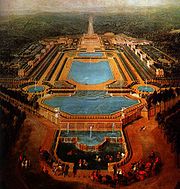 |
Château de Marly The Château de Marly was a relatively small French royal residence located in what has become Marly-le-Roi, the commune that existed at the edge of the royal park. The town that originally grew up to service the château is now a dormitory community for Paris.... (destroyed) |
Marly-le-Roi Marly-le-Roi Marly-le-Roi is a commune in the Yvelines department in the Île-de-France region in north-central France. It is located in the western suburbs of Paris from the centre.... , Yvelines Yvelines Yvelines is a French department in the region of Île-de-France.-History:Yvelines was created from the western part of the defunct department of Seine-et-Oise on 1 January 1968 in accordance with a law passed on 10 January 1964 and a décret d'application from 26 February 1965.It gained the... |
Louis XIV |
| Château de Meudon The former Château de Meudon, on a hill in Meudon, about 4 kilometres south-west of Paris, occupied the terraced steeply sloping site. It was acquired by Louis XIV, who greatly expanded its as a residence for Louis, le Grand Dauphin... (destroyed) |
Meudon Meudon Meudon is a municipality in the southwestern suburbs of Paris, France. It is in the département of Hauts-de-Seine. It is located from the center of Paris.-Geography:... , Hauts-de-Seine Hauts-de-Seine Hauts-de-Seine is designated number 92 of the 101 départements in France. It is part of the Île-de-France region, and covers the western inner suburbs of Paris... |
Le Grand Dauphin | |
| Château de Champs-sur-Marne Château de Champs-sur-Marne The Château de Champs, at Champs-sur-Marne was built in its present form for the treasurer Charles Renouard de la Touane in 1699 by Pierre Bullet, architecte du roi. After the first proprietor's bankruptcy, another financier, Paul Poisson de Bourvalais, took up the project... |
Champs-sur-Marne Champs-sur-Marne Champs-sur-Marne is a commune in the eastern suburbs of Paris, France. It is located in the Seine-et-Marne Departments of France in the Île-de-France region from the center of Paris.... , Seine-et-Marne Seine-et-Marne Seine-et-Marne is a French department, named after the Seine and Marne rivers, and located in the Île-de-France region.- History:Seine-et-Marne is one of the original 83 departments, created on March 4, 1790 during the French Revolution in application of the law of December 22, 1789... |
Charles Renouard de La Touanne | |
 |
Château de Dampierre Château de Dampierre The Château de Dampierre is the castle in Dampierre-en-Yvelines, in the Vallée de Chevreuse, France.Built by Jules Hardouin-Mansart, 1675-1683 for the duc de Chevreuse, Colbert's son-in-law, it is a French Baroque château of manageable size... |
Dampierre-en-Yvelines Dampierre-en-Yvelines Dampierre-en-Yvelines is a commune in the Yvelines department in the Île-de-France region in north-central France.-People:* Honoré d'Albert, Dukes of Luynes * Éric Judor, humorist* Ian Delépine, humorist... |
Charles Honoré d'Albert, duc de Luynes |
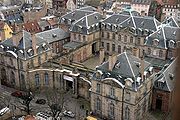 |
Palais Rohan Palais Rohan, Strasbourg The Palais Rohan is one of the most important buildings in the city of Strasbourg in Alsace, France. It represents not only the high point of local baroque architecture, according to widespread opinion among art historians, but has also housed three of the most important museums in the city since... |
Strasbourg Strasbourg Strasbourg is the capital and principal city of the Alsace region in eastern France and is the official seat of the European Parliament. Located close to the border with Germany, it is the capital of the Bas-Rhin département. The city and the region of Alsace are historically German-speaking,... |
Armand Gaston Maximilien de Rohan Armand Gaston Maximilien de Rohan Armand de Rohan was a French churchman and politician. He became bishop of Strasbourg in 1704, Cardinal in 1712 then grand almoner of France in 1713 and member of the regency council in 1722.... |
 |
Hôtel de Soubise Hôtel de Soubise The Hôtel de Soubise is a city mansion entre cour et jardin , located at 60 rue des Francs-Bourgeois, in the IIIe arrondissement of Paris.... |
Paris Paris Paris is the capital and largest city in France, situated on the river Seine, in northern France, at the heart of the Île-de-France region... |
François de Rohan-Soubise |
| Ducal Palace of Nancy (extension) |
Nancy | Stanislas Leszczyński | |
| Château de Lunéville Château de Lunéville The Château de Lunéville which had belonged to the Dukes of Lorraine since the thirteenth century, was rebuilt as “the Versailles of Lorraine” by Duke Léopold from 1703 to 1723, from designs of Pierre Bourdict and Nicolas Dorbay and then of the architect Germain Boffrand, whose masterwork it became... |
Lunéville Lunéville Lunéville is a commune in the Meurthe-et-Moselle department in France.It is a sub-prefecture of the department and lies on the Meurthe River.-History:... |
Leopold of Lorraine | |
| Château de Commercy Château de Commercy The Château de Commercy is a castle in the town of Commercy, in the Meuse department of France. It was the principal residence of the reigning Prince of Commercy and was built by Charles Henri de Lorraine... |
Commercy Commercy Commercy is a commune in the Meuse department in Lorraine in north-eastern France.It is the home of the madeleines referred to by Marcel Proust in A la Recherche du Temps Perdu.-History:... |
Charles Henri de Lorraine | |
| Château d'Haroué Château d'Haroué The château de Craon, also known as the château d'Haroué or palais d'Haroué is a French château located in a small valley in the centre of the village of Haroué, in the Saintois, in the département of Meurthe-et-Moselle and the région of Lorraine... |
Haroué Haroué Haroué is a commune in the Meurthe-et-Moselle department in north-eastern France.-Historical Features:The Château de Haroué was constructed between 1720 and 1732 by Germain Boffrand for Prince Marc de Beauvau, Viceroy of Tuscany. The architect had to integrate into his plans the four towers and the... |
Marc de Beauvau |
Italy
| Image | Name | Location | First owner |
|---|---|---|---|
| Palazzina di Stupinigi | Stupinigi Stupinigi The Palazzina di caccia of Stupinigi is one of the Residences of the Royal House of Savoy in northern Italy, part of the UNESCO World Heritage Sites list... |
Victor Amadeus II of Sardinia Victor Amadeus II of Sardinia Victor Amadeus II was Duke of Savoy from 1675 to 1730. He also held the titles of marquis of Saluzzo, duke of Montferrat, prince of Piedmont, count of Aosta, Moriana and Nizza. Louis XIV organised his marriage in order to maintain French influence in the Duchy but Victor Amadeus soon broke away... |
|
| Royal Palace of Turin Royal Palace of Turin Royal Palace of Turin or Palazzo Reale, is a palace in Turin, northern Italy. It was the royal palace of the House of Savoy. It was modernised greatly by the French born Madama Reale Christine Marie of France in the seventeenth century. The palace was worked on by Filippo Juvarra... (rebuilt) |
Turin Turin Turin is a city and major business and cultural centre in northern Italy, capital of the Piedmont region, located mainly on the left bank of the Po River and surrounded by the Alpine arch. The population of the city proper is 909,193 while the population of the urban area is estimated by Eurostat... |
Victor Amadeus II | |
| Palazzo Carignano Palazzo Carignano The Palazzo Carignano is a historical building in the centre of Turin, Italy, which currently houses the Museum of the Risorgimento. It was once a private residence of the Princes of Carignano, after whom it is named. It is famous for its unique rounded façade... |
Turin Turin Turin is a city and major business and cultural centre in northern Italy, capital of the Piedmont region, located mainly on the left bank of the Po River and surrounded by the Alpine arch. The population of the city proper is 909,193 while the population of the urban area is estimated by Eurostat... |
Emmanuel-Philibert of Savoy-Carignan | |
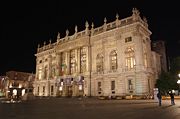 |
Palazzo Madama, Turin Palazzo Madama, Turin Palazzo Madama e Casaforte degli Acaja is a palace in Turin, northern Italy.-History:At the beginning of the first century BC, the site of the palace was occupied by a gate in the Roman walls from which the decumanus maximus of Augusta Taurinorum departed. Two of the towers, although restored,... (extension) |
Turin Turin Turin is a city and major business and cultural centre in northern Italy, capital of the Piedmont region, located mainly on the left bank of the Po River and surrounded by the Alpine arch. The population of the city proper is 909,193 while the population of the urban area is estimated by Eurostat... |
Marie Jeanne Baptiste de Savoie-Nemours |
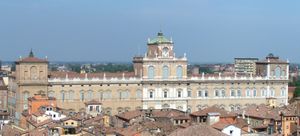 |
Ducal Palace of Modena Ducal Palace of Modena The Ducal Palace of Modena is a Baroque palace in Modena, Italy. It was the residence of the Este Dukes of Modena between 1452 and 1859. It currently houses a portion of the Italian Military Academy.-History:... |
Modena Modena Modena is a city and comune on the south side of the Po Valley, in the Province of Modena in the Emilia-Romagna region of Italy.... |
House of Este |
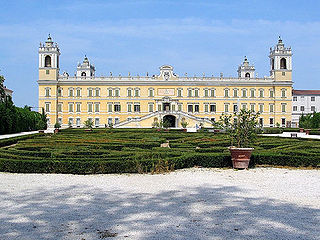 |
Ducal Palace of Colorno Ducal Palace of Colorno The Ducal Palace, also known as Reggia di Colorno, is an edifice in the territory of Colorno , Emilia Romagna, Italy. It was built by Francesco Farnese, Duke of Parma in the early 18th century on the remains of a former castle.-History:... |
Colorno Colorno Colorno is a comune in the Province of Parma in the Italian region Emilia-Romagna, located about 90 km northwest of Bologna and about 15 km north of Parma... |
Francesco Farnese, Duke of Parma Francesco Farnese, Duke of Parma Francesco Farnese reigned as the seventh and penultimate Farnese Duke of Parma and Piacenza from 1694 until his death... |
| Palazzo Estense Palazzo Estense The Palazzo Estense is a Baroque palace built for the Francesco III d'Este and the House of Este in Varese, Italy.-History:The palace was designed by architect Giuseppe Bianchi and was completed in 1760... |
Varese Varese Varese is a town and comune in north-western Lombardy, northern Italy, 55 km north of Milan.It is the capital of the Province of Varese. The hinterland or urban part of the city is called Varesotto.- Geography :... |
Francesco III d'Este Francesco III d'Este Francesco III was Duke of Modena and Reggio from 1737 until his death.-Biography:He was born in Modena, the son of Rinaldo d'Este, Duke of Modena, and Charlotte of Brunswick-Lüneburg.... |
|
| Villa Reale di Monza | Monza Monza Monza is a city and comune on the river Lambro, a tributary of the Po, in the Lombardy region of Italy some 15 km north-northeast of Milan. It is the capital of the Province of Monza and Brianza. It is best known for its Grand Prix motor racing circuit, the Autodromo Nazionale Monza.On June... |
Archduke Ferdinand | |
| Villa Stra Villa Pisani Villa Pisani is the name shared by a number of villas commissioned by the patrician Pisani family of Venice. However, Villa Pisani usually refers to a large, late baroque villa at Stra on the mainland of the Veneto, northern Italy. It was begun in the early 18th century for Alvise Pisani, the most... |
Stra Stra Stra is a town and comune in the province of Venice, Veneto, Italy. It is south of SR11. It is the location of the famed Villa Pisani located on the Brenta canal.-Sources:*... |
Alvise Pisani Alvise Pisani Alvise Pisani was the 114th Doge of Venice, serving from 17 January 1735 until his death. Prior to his election, he was a career diplomat, serving as Venice's ambassador to France, Austria, and Spain; he also served as a councilor to previous Doges. He was succeeded as Doge by Pietro Grimani.-... |
|
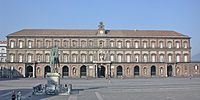 |
Royal Palace of Naples (rebuilt) |
Naples Naples Naples is a city in Southern Italy, situated on the country's west coast by the Gulf of Naples. Lying between two notable volcanic regions, Mount Vesuvius and the Phlegraean Fields, it is the capital of the region of Campania and of the province of Naples... |
Charles VII of Naples |
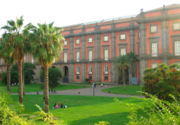 |
Palace of Capodimonte Palace of Capodimonte The Palace of Capodimonte is a grand Bourbon palazzo in Naples, Italy, formerly the summer residence and hunting lodge of the kings of the Two Sicilies. It today houses the National Museum of Capodimonte and art gallery of the city... |
Naples Naples Naples is a city in Southern Italy, situated on the country's west coast by the Gulf of Naples. Lying between two notable volcanic regions, Mount Vesuvius and the Phlegraean Fields, it is the capital of the region of Campania and of the province of Naples... |
Charles VII |
| Palace of Portici Palace of Portici The Royal Palace of Portici is a former royal palace in Portici, southern Italy. Today it is the home of the Orto Botanico di Portici. The Botanic Gardens are operated by the University of Naples Federico II... |
Portici Portici Portici is a town and comune of the Province of Naples in the Campania region of southern Italy. It is the site of the Portici Royal Palace.-Geography:... |
Charles VII | |
| Palace of Caserta (the largest building in 18th-century Europe) |
Caserta Caserta Caserta is the capital of the province of Caserta in the Campania region of Italy. It is an important agricultural, commercial and industrial comune and city. Caserta is located on the edge of the Campanian plain at the foot of the Campanian Subapennine mountain range... |
Charles VII |
Spain
| Image | Name | Location | First owner |
|---|---|---|---|
_07.jpg) |
Royal Palace of Madrid Royal Palace of Madrid The Palacio Real de Madrid is the official residence of the King of Spain in the city of Madrid, but it is only used for state ceremonies. King Juan Carlos and the Royal Family do not reside in the palace, choosing instead the more modest Palacio de la Zarzuela on the outskirts of Madrid... |
Madrid Madrid Madrid is the capital and largest city of Spain. The population of the city is roughly 3.3 million and the entire population of the Madrid metropolitan area is calculated to be 6.271 million. It is the third largest city in the European Union, after London and Berlin, and its metropolitan... |
Philip V of Spain Philip V of Spain Philip V was King of Spain from 15 November 1700 to 15 January 1724, when he abdicated in favor of his son Louis, and from 6 September 1724, when he assumed the throne again upon his son's death, to his death.Before his reign, Philip occupied an exalted place in the royal family of France as a... |
| Royal Palace of Aranjuez | Aranjuez Aranjuez Aranjuez is a town lying 48 km south of Madrid, in the southern part of the Community of Madrid. It is located at the confluence of the Tagus and Jarama rivers, 48 km from Toledo. As of 2009, it has a population of 54,055.-History:... |
Philip V | |
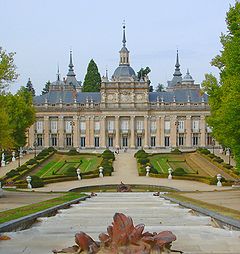 |
Palace of La Granja | San Ildefonso San Ildefonso San Ildefonso, or La Granja, or La Granja de San Ildefonso, is a town and municipality in the province of Segovia, Spain, situated some 54 km northwest of Madrid.-History:... |
Philip V |
 |
Royal Palace of Riofrío | Riofrío Riofrío Riofrío is a municipality located in the province of Ávila, Castile and León, Spain. According to the 2004 census , the municipality has a population of 325 inhabitants.... , Segovia Segovia Segovia is a city in Spain, the capital of Segovia Province in the autonomous community of Castile and León. It is situated north of Madrid, 30 minutes by high speed train. The municipality counts some 55,500 inhabitants.-Etymology:... |
Isabella Farnese |
Portugal
| Image | Name | Location | First owner |
|---|---|---|---|
| Mafra Palace | Mafra Mafra, Portugal Mafra is a town in Mafra Municipality in Portugal.The town is 28 km north-west from the center of Lisbon. It is mostly known for the sumptuous Palácio de Mafra , which also makes it a popular tourist destination in the Lisbon area... |
John V of Portugal | |
 |
Belém Palace Belém Palace The Belém National Palace, or alternately National Palace of Belém, has, overtime, been the official residence of Portuguese monarchs and, after the installation of the First Republic, the Presidents of the Portuguese Republic... |
Lisbon Lisbon Lisbon is the capital city and largest city of Portugal with a population of 545,245 within its administrative limits on a land area of . The urban area of Lisbon extends beyond the administrative city limits with a population of 3 million on an area of , making it the 9th most populous urban... |
John V |
 |
Palácio das Necessidades Palace of Necessidades The Palace of Necessidades is a historical building in the Largo do Rilvas, a public square in Lisbon, Portugal... |
Lisbon Lisbon Lisbon is the capital city and largest city of Portugal with a population of 545,245 within its administrative limits on a land area of . The urban area of Lisbon extends beyond the administrative city limits with a population of 3 million on an area of , making it the 9th most populous urban... |
John V |
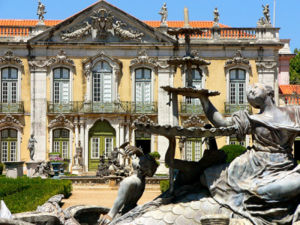 |
Queluz Palace | Queluz (Sintra) Queluz (Sintra) Queluz is a Portuguese city and parish ,located in the municipality of Sintra, in the Lisbon District. The city of Queluz, which includes the parishes of Queluz, Massamá and Monte Abraão, has a combined population of approximately 111,424 and it is located in the municipality of Sintra, in the... |
Peter III of Portugal Peter III of Portugal Peter III became King of the Kingdom of Portugal and the Algarves by the accession of his wife and niece Queen Maria I in 1777, and co-reigned alongside her until his death.-Biography:... |
England
| Image | Name | Location | First owner |
|---|---|---|---|
| Hampton Court Palace Hampton Court Palace Hampton Court Palace is a royal palace in the London Borough of Richmond upon Thames, Greater London; it has not been inhabited by the British royal family since the 18th century. The palace is located south west of Charing Cross and upstream of Central London on the River Thames... (additions by Sir Christopher Wren Christopher Wren Sir Christopher Wren FRS is one of the most highly acclaimed English architects in history.He used to be accorded responsibility for rebuilding 51 churches in the City of London after the Great Fire in 1666, including his masterpiece, St. Paul's Cathedral, on Ludgate Hill, completed in 1710... ) |
Richmond upon Thames Richmond upon Thames Richmond is a town in southwest London, England and is part of the London Borough of Richmond upon Thames. It is located west-southwest of Charing Cross.... |
William and Mary William and Mary The phrase William and Mary usually refers to the coregency over the Kingdoms of England, Scotland and Ireland, of King William III & II and Queen Mary II... |
|
| Kensington Palace Kensington Palace Kensington Palace is a royal residence set in Kensington Gardens in the Royal Borough of Kensington and Chelsea in London, England. It has been a residence of the British Royal Family since the 17th century and is the official London residence of the Duke and Duchess of Cambridge, the Duke and... |
London London London is the capital city of :England and the :United Kingdom, the largest metropolitan area in the United Kingdom, and the largest urban zone in the European Union by most measures. Located on the River Thames, London has been a major settlement for two millennia, its history going back to its... |
William and Mary | |
| Blenheim Palace Blenheim Palace Blenheim Palace is a monumental country house situated in Woodstock, Oxfordshire, England, residence of the dukes of Marlborough. It is the only non-royal non-episcopal country house in England to hold the title of palace. The palace, one of England's largest houses, was built between... |
Woodstock, Oxfordshire Woodstock, Oxfordshire Woodstock is a small town northwest of Oxford in Oxfordshire, England. It is the location of Blenheim Palace, a UNESCO World Heritage Site.Winston Churchill was born in Blenheim Palace in 1874 and is buried in the nearby village of Bladon.... |
John Churchill, 1st Duke of Marlborough John Churchill, 1st Duke of Marlborough John Churchill, 1st Duke of Marlborough, Prince of Mindelheim, KG, PC , was an English soldier and statesman whose career spanned the reigns of five monarchs through the late 17th and early 18th centuries... |
|
| Castle Howard Castle Howard Castle Howard is a stately home in North Yorkshire, England, north of York. One of the grandest private residences in Britain, most of it was built between 1699 and 1712 for the 3rd Earl of Carlisle, to a design by Sir John Vanbrugh... |
North Yorkshire North Yorkshire North Yorkshire is a non-metropolitan or shire county located in the Yorkshire and the Humber region of England, and a ceremonial county primarily in that region but partly in North East England. Created in 1974 by the Local Government Act 1972 it covers an area of , making it the largest... |
Charles Howard, 3rd Earl of Carlisle Charles Howard, 3rd Earl of Carlisle Charles Howard, 3rd Earl of Carlisle, PC was a British statesman and member of the peerage of England.Charles Howard was the eldest son of Edward Howard and inherited his title on the death of his father in 1692. He married in 1683 Lady Anne de Vere Capell, daughter of Arthur Capell, 1st Earl of... |
|
| Chatsworth House Chatsworth House Chatsworth House is a stately home in North Derbyshire, England, northeast of Bakewell and west of Chesterfield . It is the seat of the Duke of Devonshire, and has been home to his family, the Cavendish family, since Bess of Hardwick settled at Chatsworth in 1549.Standing on the east bank of the... |
Chatsworth, Derbyshire Chatsworth, Derbyshire Chatsworth is a civil parish in Derbyshire, England, within the area of the Derbyshire Dales and the Peak District National Park.The population is largely in and around Chatsworth House and is considered to be too low to justify a parish council... |
William Cavendish, 1st Duke of Devonshire William Cavendish, 1st Duke of Devonshire William Cavendish, 1st Duke of Devonshire KG PC was a soldier and Whig statesman, the son of William Cavendish, 3rd Earl of Devonshire and Lady Elizabeth Cecil.-Life:... |
Rhineland and Netherlands
| Image | Name | Location | First owner |
|---|---|---|---|
 |
Het Loo Palace | Apeldoorn Apeldoorn Apeldoorn is a municipality and city in the province of Gelderland, about 60 miles south east of Amsterdam, in the centre of the Netherlands. It is a regional centre and has 155,000 . The municipality of Apeldoorn, including villages like Beekbergen, Loenen and Hoenderloo, has over 155,000... |
William and Mary William and Mary The phrase William and Mary usually refers to the coregency over the Kingdoms of England, Scotland and Ireland, of King William III & II and Queen Mary II... |
| Münster Residence | Münster Münster Münster is an independent city in North Rhine-Westphalia, Germany. It is located in the northern part of the state and is considered to be the cultural centre of the Westphalia region. It is also capital of the local government region Münsterland... |
Maximilian Franz von Österreich | |
| Schloss Nordkirchen Schloss Nordkirchen Schloss Nordkirchen in the Gemeinde Nordkirchen in Kreis Coesfeld, Westphalia, Germany, built in 1703 to 1734, is known as the "Versailles of Westphalia" as it is the largest of the partly moated Wasserschlösser in that region... |
Nordkirchen Nordkirchen Nordkirchen is a municipality in the district of Coesfeld, in North Rhine-Westphalia, Germany. Nordkirchen's most famous site is Schloss Nordkirchen, built in the 18th century for a local bishop and known as the Versailles of Westphalia, as it is the largest residence in that part of Germany... |
Prince-bishops of Munster | |
| Anholt Castle (rebuilt) |
Isselburg Isselburg Isselburg is a town in the district of Borken, in North Rhine-Westphalia, Germany. It is located on the river Issel, near the border with the Netherlands, and approximately 10 km west of Bocholt.-Division:... |
Princes of Salm-Salm Salm-Salm The Principality of Salm-Salm was a state of the Holy Roman Empire. It was located in the present-day French départements of the Bas-Rhin and the Vosges and was one of a number of partitions of Salm.-History:... |
Rhine electorates
| Image | Name | Location | First owner |
|---|---|---|---|
 |
Electoral Palace of Bonn | Bonn Bonn Bonn is the 19th largest city in Germany. Located in the Cologne/Bonn Region, about 25 kilometres south of Cologne on the river Rhine in the State of North Rhine-Westphalia, it was the capital of West Germany from 1949 to 1990 and the official seat of government of united Germany from 1990 to 1999.... |
Archbishop of Cologne |
| Schloss Weißenstein | Pommersfelden Pommersfelden Pommersfelden is a community in the Upper Franconian district of Bamberg.-Constituent communities:The community of Pommersfelden is subdivided into four Gemarkungen with a total of ten settled centres, each given here with its own population figure:*Gemarkung Oberndorf:-Population... |
Archbishop of Mainz (Lothar Franz von Schönborn Lothar Franz von Schönborn Lothar Franz von Schönborn was the Archbishop-Elector of Mainz from 1694 until 1729, and the Bishop of Bamberg from 1693 until 1729.Lothar Franz was born in Steinheim am Main in 1655 to Count Philip Erwin of Schönborn... ) |
|
 |
Mannheim Palace Mannheim Palace Mannheim Palace is a large Baroque palace in Mannheim, Baden-Württemberg, Germany. It was originally the main residence of the Prince-electors of the Electoral Palatinate... |
Mannheim Mannheim Mannheim is a city in southwestern Germany. With about 315,000 inhabitants, Mannheim is the second-largest city in the Bundesland of Baden-Württemberg, following the capital city of Stuttgart.... |
Charles III Philip, Elector Palatine |
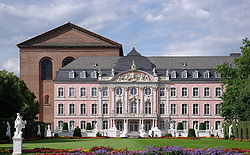 |
Electoral Palace of Trier | Trier Trier Trier, historically called in English Treves is a city in Germany on the banks of the Moselle. It is the oldest city in Germany, founded in or before 16 BC.... |
Archbishop of Trier |
| Augustusburg and Falkenlust Augustusburg and Falkenlust Palaces, Brühl The Augustusburg and Falkenlust palaces is a historical building complex in Brühl, North Rhine-Westphalia, Germany, which have been listed as a UNESCO cultural World Heritage Site since 1984. They are connected by the spacious gardens and trees of the Schlosspark.Augustusburg Palace and its parks... |
Brühl Brühl, North Rhine-Westphalia Brühl is a town in the Rhineland of Germany. It is located in Rhein-Erft-Kreis, 20 km south of Cologne city center and at the edge of Naturpark Kottenforst-Ville Nature Reserve.-History:... |
Archbishop of Cologne (Clemens August of Bavaria Clemens August of Bavaria Clemens August of Bavaria was a member of the Wittelsbach dynasty of Bavaria and Archbishop-Elector of Cologne.-Biography:... ) |
|
| Schloss Benrath Schloss Benrath Schloss Benrath is a Rococo maison de plaisance near Düsseldorf, Germany, erected for the Elector Palatine Charles Theodore by his garden and building director and garden supervisor, Nicolas de Pigage... |
Düsseldorf Düsseldorf Düsseldorf is the capital city of the German state of North Rhine-Westphalia and centre of the Rhine-Ruhr metropolitan region.Düsseldorf is an important international business and financial centre and renowned for its fashion and trade fairs. Located centrally within the European Megalopolis, the... |
Charles Theodore, Elector Palatine |
Baden and Württemberg
| Image | Name | Location | First owner | |
|---|---|---|---|---|
| Schloss Rastatt Schloss Rastatt Schloss Rastatt is a historical building in Rastatt, Germany. The palace and the Garden were built between 1700 and 1707 by the Italian architect Domenico Egidio Rossi as ordered by Margrave Louis William of Baden.-History:... |
Rastatt Rastatt Rastatt is a city and baroque residence in the District of Rastatt, Baden-Württemberg, Germany. It is located on the Murg river, above its junction with the Rhine and has a population of around 50'000... |
Louis of Baden | ||
| Ludwigsburg Palace Ludwigsburg Palace Ludwigsburg Palace is a historical building in the city of Ludwigsburg , Germany. It is one of the country's largest Baroque palaces and features an enormous garden in that style.... |
Ludwigsburg Ludwigsburg Ludwigsburg is a city in Baden-Württemberg, Germany, about north of Stuttgart city centre, near the river Neckar. It is the largest and primary city of the Ludwigsburg urban district with about 87,000 inhabitants... |
Eberhard Louis of Württemberg | ||
| Karlsruhe Palace Karlsruhe Palace Karlsruhe Palace was erected in 1715 by Margrave Charles III William of Baden-Durlach, after a dispute with the citizens of his previous capital, Durlach... |
Karlsruhe Karlsruhe The City of Karlsruhe is a city in the southwest of Germany, in the state of Baden-Württemberg, located near the French-German border.Karlsruhe was founded in 1715 as Karlsruhe Palace, when Germany was a series of principalities and city states... |
Charles III William, Margrave of Baden-Durlach | ||
| Stuttgart Residence New Castle (Stuttgart) The New Palace is a building which stands on the south edge of Schlossplatz, the central square in Stuttgart, Germany. The castle is built in late Baroque style.... {rebuilt after destruction) |
Stuttgart Stuttgart Stuttgart is the capital of the state of Baden-Württemberg in southern Germany. The sixth-largest city in Germany, Stuttgart has a population of 600,038 while the metropolitan area has a population of 5.3 million .... |
Charles Eugene of Württemberg | ||
| Pleasure palaces | ||||
| Schloss Favorite Schloss Favorite (Rastatt) Schloss Favorite is a castle on the outskirts of Rastatt-Förch in Baden-Württemberg, Germany. Built by Johann Michael Ludwig Rohrer between 1710 and 1730, it was a pleasure and hunting palace used by Margravine Franziska Sibylla Augusta of Sachsen-Lauenburg, widow of Louis William, Margrave of... |
Rastatt Rastatt Rastatt is a city and baroque residence in the District of Rastatt, Baden-Württemberg, Germany. It is located on the Murg river, above its junction with the Rhine and has a population of around 50'000... |
Sibylle Auguste of Saxe-Lauenburg Sibylle Auguste of Saxe-Lauenburg Sibylle of Saxe-Lauenburg was Margravine of Baden-Baden. Born a Duchess of Saxe-Lauenburg, she was the wife of Louis William, Margrave of Baden-Baden, a famous Imperial general who was known as the Türkenlouis... |
||
| Favorite Ludwigsburg Favorite Ludwigsburg Schloss Favorite is a Baroque maison de plaisance and hunting lodge in Ludwigsburg, Germany. It is located on a rise, directly north of Ludwigsburg Palace.... |
Ludwigsburg Ludwigsburg Ludwigsburg is a city in Baden-Württemberg, Germany, about north of Stuttgart city centre, near the river Neckar. It is the largest and primary city of the Ludwigsburg urban district with about 87,000 inhabitants... |
Eberhard Louis of Württemberg | ||
| Castle Solitude Castle Solitude Castle Solitude in Stuttgart, Germany , was built as a hunting lodge between 1764 and 1769 under Duke Karl Eugen of Württemberg. It is not a true castle, but rather a rococo palace. Since 1956 the area is part of the urban district of Stuttgart-West. The castle is located on a high plain between... |
Stuttgart Stuttgart Stuttgart is the capital of the state of Baden-Württemberg in southern Germany. The sixth-largest city in Germany, Stuttgart has a population of 600,038 while the metropolitan area has a population of 5.3 million .... |
Charles Eugene of Württemberg | ||
Bavaria
| Image | Name | Location | First owner |
|---|---|---|---|
 |
Würzburg Residence Würzburg Residence The Würzburg Residence is a palace in Würzburg, southern Germany. Johann Lukas von Hildebrandt and Maximilian von Welsch, representants of the Austrian/South German Baroque were involved in the construction, as well as Robert de Cotte and Germain Boffrand, who were followers of the French Style... |
Würzburg Würzburg Würzburg is a city in the region of Franconia which lies in the northern tip of Bavaria, Germany. Located at the Main River, it is the capital of the Regierungsbezirk Lower Franconia. The regional dialect is Franconian.... |
Johann Philipp Franz von Schönborn |
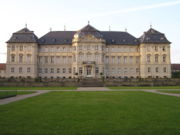 |
Werneck Residence | Werneck Werneck Werneck is a market town in the district of Schweinfurt in Lower Franconia, Bavaria, Germany.-Geography:Werneck is in the Main-Rhön region of Bavaria, approximately 12 km from Schweinfurt and 25 km from Würzburg. It is located on a bend in the Wern, a tributary of the Main, on the edge of... |
Friedrich Karl von Schönborn |
| Veitshöchheim Residence | Veitshöchheim Veitshöchheim Veitshöchheim is a municipality in the district of Würzburg, in Bavaria, Germany. It is situated on the right bank of the Main, 6 km northwest of Würzburg. In the town is Schloss Veitshöchheim; this summer palace of the Prince-Bishops of Würzburg was built in 1680-82, and was enlarged to its... |
Peter Philipp von Dernbach | |
| Ansbach Residence | Ansbach Ansbach Ansbach, originally Onolzbach, is a town in Bavaria, Germany. It is the capital of the administrative region of Middle Franconia. Ansbach is situated southwest of Nuremberg and north of Munich, on the Fränkische Rezat, a tributary of the Main river. As of 2004, its population was 40,723.Ansbach... |
Bishops of Ansbach | |
| Schleissheim Palace Schleissheim Palace The Schleissheim Palace actually comprises three palaces in a grand baroque park in the village of Oberschleißheim near Munich, Bavaria, Germany. The palace was the summer residence of the rulers of Bavaria.-Old Schleissheim Palace:... |
Oberschleißheim Oberschleißheim Oberschleißheim is a municipality in the district of Munich, in Bavaria, Germany. It is located 13 km north of Munich . As of 2005 it had a population of 11,467.... |
Maximilian II Emanuel | |
| Nymphenburg Palace Nymphenburg Palace The Nymphenburg Palace , i.e. "Nymph's Castle", is a Baroque palace in Munich, Bavaria, southern Germany. The palace was the main summer residence of the rulers of Bavaria.-History:... |
Munich Munich Munich The city's motto is "" . Before 2006, it was "Weltstadt mit Herz" . Its native name, , is derived from the Old High German Munichen, meaning "by the monks' place". The city's name derives from the monks of the Benedictine order who founded the city; hence the monk depicted on the city's coat... |
House of Wittelsbach | |
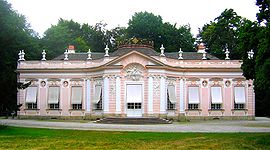 |
Amalienburg Amalienburg The Amalienburg is a small hunting lodge in the Nymphenburg Palace of Munich, southern Germany. It was constructed in 1734-1739 by François de Cuvilliés, in Rococo style, for the Holy Roman Emperor Charles VII and his wife, Maria Amalia of Austria.... |
Munich Munich Munich The city's motto is "" . Before 2006, it was "Weltstadt mit Herz" . Its native name, , is derived from the Old High German Munichen, meaning "by the monks' place". The city's name derives from the monks of the Benedictine order who founded the city; hence the monk depicted on the city's coat... |
Maria Amalia of Austria Maria Amalia of Austria Maria Amalia of Austria was the younger daughter of Holy Roman Emperor Joseph I and Wilhelmine Amalia of Brunswick-Lüneburg... |
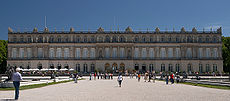 |
Herrenchiemsee Palace Herrenchiemsee Herrenchiemsee is a complex of royal buildings on the Herreninsel, an island in the Chiemsee, Bavaria's largest lake, 60 km south east of Munich. Together with the neighbouring island of Frauenchiemsee and the uninhabited Krautinsel it forms the municipality of Chiemsee... |
Herreninsel, Chiemsee Chiemsee Chiemsee is a freshwater lake in Bavaria, Germany, between Rosenheim, Germany, and Salzburg, Austria. It is often called the Bavarian Sea. The rivers Tiroler Achen and Prien flow into the lake; the river Alz, out of it... |
Ludwig II Ludwig II of Bavaria Ludwig II was King of Bavaria from 1864 until shortly before his death. He is sometimes called the Swan King and der Märchenkönig, the Fairy tale King... |
Habsburg Empire
| Image | Name | Location | First owner | |
|---|---|---|---|---|
| Schönbrunn Palace Schönbrunn Palace Schönbrunn Palace is a former imperial 1,441-room Rococo summer residence in Vienna, Austria. One of the most important cultural monuments in the country, since the 1960s it has been one of the major tourist attractions in Vienna... |
Vienna Vienna Vienna is the capital and largest city of the Republic of Austria and one of the nine states of Austria. Vienna is Austria's primary city, with a population of about 1.723 million , and is by far the largest city in Austria, as well as its cultural, economic, and political centre... |
House of Habsburg | ||
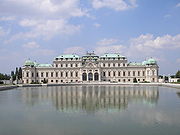 |
Belvedere Palace | Vienna | Eugene of Savoy | |
| Schloss Laxenburg Schloss Laxenburg Laxenburg castles are imperial palaces and castles outside Vienna, in the town of Laxenburg, Lower Austria. The castles became a Habsburg possession in 1333 and formerly served as a summer retreat, along with Schönbrunn palace, for the imperial Habsburg dynasty. Blauer Hof Palace was the birthplace... |
Laxenburg Laxenburg Laxenburg is a town in the district of Mödling in the Austrian state of Lower Austria, near Vienna.- History :The place is well-known for its castle, Schloss Laxenburg, which, beside Schönbrunn, was the most important summer seat of the Habsburg dynasty.... |
Maria Theresia | ||
 |
Palais Schwarzenberg Palais Schwarzenberg Palais Schwarzenberg is a Baroque palace in front of Schwarzenbergplatz, Landstraße, the 3rd district of Vienna, Austria. It is owned by the princely Schwarzenberg family.... |
Vienna | Adam Franz von Schwarzenberg | |
| Austerlitz Palace | Slavkov u Brna Slavkov u Brna Slavkov u Brna is a country town east of Brno in the South Moravian Region of the Czech Republic. Population: 5,900. The town is widely known for giving its name to the Battle of Austerlitz which actually took place several kilometres to the west of the town.... |
Wenzel Anton von Kaunitz | ||
 |
Schloss Halbturn | Halbturn Halbturn Halbturn is a town in the district of Neusiedl am See in Burgenland in Austria. The village borders Hungary to the east and is near Andau, Gols and Mönchof.thumb|left|Castle Halbturn... |
Emperor Charles VI Charles VI, Holy Roman Emperor Charles VI was the penultimate Habsburg sovereign of the Habsburg Empire. He succeeded his elder brother, Joseph I, as Holy Roman Emperor, King of Bohemia , Hungary and Croatia , Archduke of Austria, etc., in 1711... |
|
| Schloss Esterházy Schloss Esterházy ----The Schloss Esterházy is a palace in Eisenstadt, Austria, the capital of the Burgenland state. It was constructed in the late 13th century, and came under ownership of the Hungarian Esterházy family in 1622... |
Eisenstadt Eisenstadt - Politics :The current mayor of Eisenstadt is Andrea Fraunschiel ÖVP.The district council is composed as follows :* ÖVP: 17 seats* SPÖ: 8 seats* Austrian Green Party: 2 seats* FPÖ: 2 seats- Castles and palaces :... |
Pál Esterházy | ||
| Schloss Eggenberg (Graz) Schloss Eggenberg (Graz) Eggenberg Palace in Graz is the most significant Baroque palace complex in Styria. With its preserved accouterments, the extensive scenic gardens as well as some additional collections from the Universalmuseum Joanneum housed in the palace and park, Schloss Eggenberg counts among the most valuable... |
Graz Graz The more recent population figures do not give the whole picture as only people with principal residence status are counted and people with secondary residence status are not. Most of the people with secondary residence status in Graz are students... |
Hans Ulrich von Eggenberg Hans Ulrich von Eggenberg Hans Ulrich von Eggenberg was an Austrian statesman, a son of Seyfried von Eggenberg and great-grandson of Balthasar Eggenberger of the House of Eggenberg.- Biography :... |
||
| Schloss Trautenfels Schloss Trautenfels Trautenfels Castle is located in the district of Liezen in Styria. It lies directly on the Enns at 673m in the municipality Pürgg-Trautenfels on a cliff protrusion at the foot of the Grimming.- History :... |
Pürgg-Trautenfels Pürgg-Trautenfels Pürgg-Trautenfels is a municipality in the district of Liezen in Styria, Austria.- Geography :Pürgg-Trautenfels lies in valley of the upper Ennstal between Gröbming and Stainach. The municipal area is bordered in the south by the Enns; in the north it stretches right up to the main ridge Toten... |
Siegmund Friedrich von Trauttmansdorff | ||
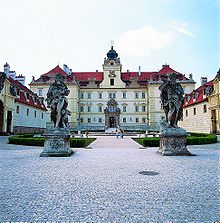 |
Feldsberg Residence Valtice The town of Valtice in the Czech Republic contains one of the most impressive Baroque residences of Central Europe. It was designed as the seat of the ruling princes of Liechtenstein by Johann Bernhard Fischer von Erlach in the early 18th century. Construction was supervised by Domenico... |
Valtice Valtice The town of Valtice in the Czech Republic contains one of the most impressive Baroque residences of Central Europe. It was designed as the seat of the ruling princes of Liechtenstein by Johann Bernhard Fischer von Erlach in the early 18th century. Construction was supervised by Domenico... |
Karl Eusebius von Liechtenstein | |
| Münchengrätz Residence | Mnichovo Hradiště Mnichovo Hradište Mnichovo Hradiště is a town in the Central Bohemian Region in the Czech Republic. Its population is 8,500.The town was first mentioned in 1279 and contains a Renaissance castle which used to belong to the Wallenstein family... |
Ernst Josef von Waldstein | ||
| Neuschloss Residence | Nové Hrady |
Jean-Antoine Harbouval de Chamaré | ||
| Jarmeritz Palace | Jaroměřice nad Rokytnou Jaromerice nad Rokytnou Jaroměřice nad Rokytnou is a town in the Czech Republic.-External links:*... |
Johann Adam von Questenberg | ||
| Buda Castle Buda Castle is the historical castle and palace complex of the Hungarian kings in Budapest, first completed in 1265. In the past, it was also called Royal Palace and Royal Castle .... (rebuilt after destruction) |
Budapest Budapest Budapest is the capital of Hungary. As the largest city of Hungary, it is the country's principal political, cultural, commercial, industrial, and transportation centre. In 2011, Budapest had 1,733,685 inhabitants, down from its 1989 peak of 2,113,645 due to suburbanization. The Budapest Commuter... |
Béla IV of Hungary Béla IV of Hungary Béla IV , King of Hungary and of Croatia , duke of Styria 1254–58. One of the most famous kings of Hungary, he distinguished himself through his policy of strengthening of the royal power following the example of his grandfather Bela III, and by the rebuilding Hungary after the catastrophe of the... |
||
| Gödöllő Residence | Gödöllő Gödöllo Gödöllő is a town situated in Pest county, Budapest metropolitan area, Hungary, about northeast from the outskirts of Budapest. Its population is about 31,000 according to the 2001 census. It can be easily reached from Budapest with the suburban railway . Gödöllő is home to the Szent István... |
Antal Grassalkovich | ||
| Festetics Palace Festetics Palace The Festetics Palace is a Baroque palace located in the town of Keszthely, Zala county, Hungary. Its construction, started by Kristóf Festetics in 1745, lasted more than a century, during which the palace, built at first on the foundations of a ruined castle, was tripled in size, in two subsequent... |
Keszthely Keszthely Keszthely is a Hungarian city of 21,100 inhabitants located on the western shore of Lake Balaton. It's the second largest city by the lake after Siófok.... |
Kristóf Festetics | ||
| Károlyi Palace | Nagymágocs Nagymágocs Nagymágocs is a village in Csongrád county, in the Southern Great Plain region of southern Hungary.-Geography:It covers an area of and has a population of 3476 people .... |
Imre Károlyi | ||
| Eszterháza Eszterháza Esterháza is a palace in Fertőd, Hungary, built by Prince Nikolaus Esterházy. Sometimes called the "Hungarian Versailles", it is Hungary's grandest Rococo edifice.-History:... |
Fertőd Fertod Fertőd is a town located in the Győr-Moson-Sopron county of Hungary, not far from Austria. Fertőd was formed when the towns of Eszterháza and Süttör were unified, in 1950.... |
Nikolaus Esterházy Nikolaus Esterházy Nikolaus Esterházy was a Hungarian prince, a member of the famous Esterházy family. His building of palaces, extravagant clothing, and taste for opera and other grand musical productions led to his being given the title "the Magnificent"... |
||
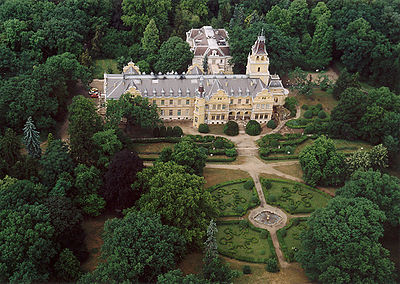 |
Wenckheim Palace | Szabadkígyós Szabadkígyós Szabadkígyós is a village in Békés County, in the Southern Great Plain region of south-east Hungary.-Geography:It covers an area of 45.56 km² and has a population of 3023 people .... |
Frigyes Wenckheim | |
| L'Huiller-Coburg Palace | Edelény Edelény Edelény is a town in Borsod-Abaúj-Zemplén county, Northern Hungary. It lies in the valley of Bódva River, north from county seat Miskolc.-History:... |
Ferenc János L'Huillier | ||
| Troja Palace | Prague Prague Prague is the capital and largest city of the Czech Republic. Situated in the north-west of the country on the Vltava river, the city is home to about 1.3 million people, while its metropolitan area is estimated to have a population of over 2.3 million... |
Wenzel Adalbert von Sternberg | ||
| Villa Amerika | Prague | Vaclav Michna | ||
| Książ Castle Ksiaz Książ is a castle in Silesia, Poland near the town of Wałbrzych. It was built in 1288-1292 under Bolko I the Strict. It lies within a protected area called Książ Landscape Park.- History :... |
Książ |
Conrad Ernest Maximilian von Hochberg | ||
| City palaces | ||||
| Archbishops' Palace | Prague Prague Prague is the capital and largest city of the Czech Republic. Situated in the north-west of the country on the Vltava river, the city is home to about 1.3 million people, while its metropolitan area is estimated to have a population of over 2.3 million... |
Archbishops of Prague | ||
| Kroměříž Palace | Kroměříž Kromeríž Kroměříž is a town in the Zlín Region of the Czech Republic. The town's main landmark is the Baroque Kroměříž Bishop's Palace, where some scenes from Amadeus and Immortal Beloved were filmed... |
Karl von Liechtenstein-Kastelkorn | ||
| Palais Auersperg Palais Auersperg The Palais Auersperg, earlier called Palais Rosenkavalier, is a baroque palace at Auerspergstraße 1 in Vienna's Josefstadt district.- History :... |
Vienna | House of Auersperg Auersperg Auersperg may refer to:* Principality of Auersperg, estates held by the princely Austrian family of Auersperg* Palais Auersperg, a large baroque palace in Vienna, build for the princely Auersperg family- Family members :... |
||
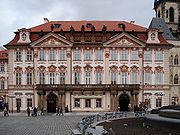 |
Palais Goltz-Kinsky | Prague | Johann Ernst von der Goltz | |
| Palais Thun-Hohenstein | Prague | Michael Oswald Thun | ||
| Summer Archbishop's Palace Summer Archbishop's Palace The Summer Archbishop's Palace or Summer Archiepiscopal Palace is a palace in Bratislava which houses the government of Slovakia... |
Bratislava Bratislava Bratislava is the capital of Slovakia and, with a population of about 431,000, also the country's largest city. Bratislava is in southwestern Slovakia on both banks of the Danube River. Bordering Austria and Hungary, it is the only national capital that borders two independent countries.Bratislava... |
Archbishops of Esztergom | ||
| Grassalkovich Palace Grassalkovich Palace The Grassalkovich Palace is a palace in Bratislava and the residence of the president of Slovakia. It is situated on Hodžovo námestie, near the Summer Archbishop's Palace.... |
Bratislava | Antal Grassalkovich | ||
| Wrocław Palace | Wrocław |
Heinrich Gottfried von Spätgen | ||
| Schaffgotsch Palace | Cieplice Śląskie-Zdrój |
Johann Nepomucen Schaffgotsch | ||
Prussia
| Image | Name | Location | First owner | |
|---|---|---|---|---|
| Charlottenburg Palace Charlottenburg Palace Charlottenburg Palace is the largest palace in Berlin, Germany, and the only royal residency in the city dating back to the time of the Hohenzollern family. It is located in the Charlottenburg district of the Charlottenburg-Wilmersdorf burough.The palace was built at the end of the 17th century... |
Charlottenburg Charlottenburg Charlottenburg is a locality of Berlin within the borough of Charlottenburg-Wilmersdorf, named after Queen consort Sophia Charlotte... , Berlin Berlin Berlin is the capital city of Germany and is one of the 16 states of Germany. With a population of 3.45 million people, Berlin is Germany's largest city. It is the second most populous city proper and the seventh most populous urban area in the European Union... |
Frederick I of Prussia Frederick I of Prussia Frederick I , of the Hohenzollern dynasty, was Elector of Brandenburg and Duke of Prussia in personal union . The latter function he upgraded to royalty, becoming the first King in Prussia . From 1707 he was in personal union the sovereign prince of the Principality of Neuchâtel... |
||
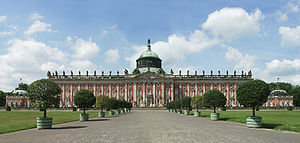 |
New Palace New Palace (Potsdam) The New Palace is a palace situated on the western side of the Sanssouci royal park in Potsdam, Germany. The building was begun in 1763, after the end of the Seven Years' War, under Frederick the Great and was completed in 1769... |
Potsdam Potsdam Potsdam is the capital city of the German federal state of Brandenburg and part of the Berlin/Brandenburg Metropolitan Region. It is situated on the River Havel, southwest of Berlin city centre.... |
Frederick II of Prussia Frederick II of Prussia Frederick II was a King in Prussia and a King of Prussia from the Hohenzollern dynasty. In his role as a prince-elector of the Holy Roman Empire, he was also Elector of Brandenburg. He was in personal union the sovereign prince of the Principality of Neuchâtel... |
|
| Sanssouci Sanssouci Sanssouci is the name of the former summer palace of Frederick the Great, King of Prussia, in Potsdam, near Berlin. It is often counted among the German rivals of Versailles. While Sanssouci is in the more intimate Rococo style and is far smaller than its French Baroque counterpart, it too is... |
Potsdam | Frederick II of Prussia | ||
| City palaces | ||||
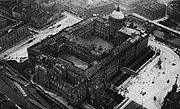 |
(destroyed) |
Berlin Berlin Berlin is the capital city of Germany and is one of the 16 states of Germany. With a population of 3.45 million people, Berlin is Germany's largest city. It is the second most populous city proper and the seventh most populous urban area in the European Union... |
Frederick I of Prussia | |
| (rebuilt after destruction) |
Potsdam Potsdam Potsdam is the capital city of the German federal state of Brandenburg and part of the Berlin/Brandenburg Metropolitan Region. It is situated on the River Havel, southwest of Berlin city centre.... |
Frederick William, Elector of Brandenburg Frederick William, Elector of Brandenburg |align=right|Frederick William was Elector of Brandenburg and Duke of Prussia – and thus ruler of Brandenburg-Prussia – from 1640 until his death. A member of the House of Hohenzollern, he is popularly known as the "Great Elector" because of his military and political prowess... |
||
| Monbijou Palace Monbijou Palace was a Rococo palace in central Berlin located in the present-day Monbijou Park on the north bank of the Spree river across from today's Bode Museum and within sight of the Hohenzollern city palace. Heavily damaged in World War II, the ruins were finally razed in 1959... (destroyed) |
Berlin Berlin Berlin is the capital city of Germany and is one of the 16 states of Germany. With a population of 3.45 million people, Berlin is Germany's largest city. It is the second most populous city proper and the seventh most populous urban area in the European Union... |
Sophia Dorothea of Hanover Sophia Dorothea of Hanover Sophia Dorothea of Hanover was a Queen consort in Prussia as wife of Frederick William I. She was the sister of George II of Great Britain and the mother of Frederick the Great.- Biography :... |
||
| Meseberg Palace | Gransee Gransee Gransee is a town in the Oberhavel district, in Brandenburg, Germany. It is situated 20 km south of Fürstenberg/Havel, and 55 km northwest of Berlin.... |
Hermann von Wartensleben | ||
Saxony
| Image | Name | Location | First owner | |
|---|---|---|---|---|
| Dresden Castle Dresden castle Dresden Castle is one of the oldest buildings in Dresden. For almost 400 years, it has been the residence of the electors and kings of Saxony... (rebuilt) |
Dresden Dresden Dresden is the capital city of the Free State of Saxony in Germany. It is situated in a valley on the River Elbe, near the Czech border. The Dresden conurbation is part of the Saxon Triangle metropolitan area.... |
Augustus II the Strong | ||
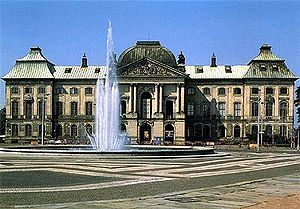 |
Japanisches Palais Japanisches Palais is a Baroque palace in Dresden, eastern Germany, built in 1715. It was extended in 1729-1731, to store the Japanese porcelain collection of Augustus the Strong , although it was never used for this purpose, and instead was used as a library.The Japanisches Palais was partly... (rebuilt after destruction) |
Dresden Dresden Dresden is the capital city of the Free State of Saxony in Germany. It is situated in a valley on the River Elbe, near the Czech border. The Dresden conurbation is part of the Saxon Triangle metropolitan area.... |
Augustus II the Strong Augustus II the Strong Frederick Augustus I or Augustus II the Strong was Elector of Saxony and King of Poland and Grand Duke of Lithuania .... |
|
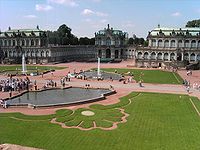 |
Zwinger The Zwinger is a palace in Dresden, eastern Germany, built in Baroque style. It served as the orangery, exhibition gallery and festival arena of the Dresden Court.... (rebuilt after destruction) |
Dresden Dresden Dresden is the capital city of the Free State of Saxony in Germany. It is situated in a valley on the River Elbe, near the Czech border. The Dresden conurbation is part of the Saxon Triangle metropolitan area.... |
Augustus II the Strong | |
| Schloss Oranienbaum | Oranienbaum, Germany Oranienbaum, Germany ' is a former town and a former municipality in the district of Wittenberg, in Saxony-Anhalt, Germany. Since 1 January 2011, it is part of the town Oranienbaum-Wörlitz... |
Henriette Catherine of Nassau Henriette Catherine of Nassau Henriette Catherine of Nassau was a daughter of Frederick Henry, Prince of Orange and his wife Amalia of Solms-Braunfels. Henriette was a member of the House of Orange-Nassau .- Family :... |
||
| Pleasure palaces | ||||
| Pillnitz Castle Pillnitz Castle Pillnitz Castle is a restored Baroque castle at the eastern end of the city of Dresden in the German state of Saxony. It is located on the bank of the River Elbe in the former village of Pillnitz... |
Pillnitz Pillnitz Pillnitz is a city quarter in the east of Dresden, Germany. The quarter is situated in the east of Dresden. It can be reached by bus, ship, walking along the river or by bicycle... |
Augustus II the Strong | ||
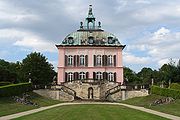 |
Fasanenschlösslein Schloss Moritzburg Schloss Moritzburg is a Baroque castle in Moritzburg, in the German state of Saxony, about northwest of the Saxon capital, Dresden. The castle has four round towers and lies on a symmetrical artificial island. It is named after Duke Moritz of Saxony, who had a hunting lodge built there between... |
Moritzburg Moritzburg Moritzburg is a municipality in the district of Meißen in Saxony, Germany, between Meißen as early centre of Saxony and the today's capital Dresden. It is most famous for its Baroque castle, Schloss Moritzburg.... |
Frederick Augustus I of Saxony Frederick Augustus I of Saxony Frederick Augustus I was King of Saxony from the House of Wettin. He was also Elector Frederick Augustus III of Saxony and Duke Frederick Augustus I of Warsaw... |
|
| Schloss Belvedere Schloss Belvedere, Weimar The Baroque Schloss Belvedere, Weimar on the outskirts of Weimar, is a pleasure-house built for house-parties, built in 1724-1732 to designs of Johann August Richter and Gottfried Heinrich Krohne for Ernst August, Duke of Saxe-Weimar. The corps de logis is flanked by symmetrical pavilions... |
Weimar Weimar Weimar is a city in Germany famous for its cultural heritage. It is located in the federal state of Thuringia , north of the Thüringer Wald, east of Erfurt, and southwest of Halle and Leipzig. Its current population is approximately 65,000. The oldest record of the city dates from the year 899... |
Ernest August of Saxe-Weimar | ||
Polish-Lithuanian Commonwealth
| Image | Name | Location | First owner | |
|---|---|---|---|---|
| Wilanów Palace Wilanów Palace Wilanów Palace is a royal palace located in the Wilanów district, Warsaw. Wilanów Palace survived the time of Poland's partitions and both World Wars and has preserved its authentic historical qualities, also is one of the most important monuments of Polish culture.The palace and park in Wilanów... |
Wilanów Wilanów Wilanów is a district of the city of Warsaw, Poland. It is home to historic Wilanów Palace, the "Polish Versailles," and second home to various Polish kings.-History:... |
John III Sobieski John III Sobieski John III Sobieski was one of the most notable monarchs of the Polish–Lithuanian Commonwealth, from 1674 until his death King of Poland and Grand Duke of Lithuania. Sobieski's 22-year-reign was marked by a period of the Commonwealth's stabilization, much needed after the turmoil of the Deluge and... |
||
| Łańcut Castle (remodeled) |
Łańcut |
Stanisław Lubomirski | ||
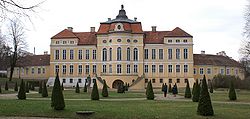 |
Rogalin Palace | Rogalin Rogalin Rogalin is a village in western Poland, situated on the Warta river. It lies approximately east of the town of Mosina, and south of the city of Poznań.... |
Kazimierz Raczyński | |
 |
(rebuilt after destruction) |
Białystok |
Jan Klemens Branicki Jan Klemens Branicki Count Jan Klemens Branicki was a Polish nobleman, magnate and Hetman, Field Crown Hetman of the Polish-Lithuanian Commonwealth between 1735 and 1752, and Great Crown Hetman between 1752 and 1771.... |
|
| Potocki Palace | Radzyń Podlaski Radzyn Podlaski Radzyń Podlaski is a town in eastern Poland, about 60 km north of Lublin, with 16,140 inhabitants . Situated in the Lublin Voivodeship , previously in Biała Podlaska Voivodeship . It is the capital of Radzyń Podlaski County.The town was founded in 1468. The most important landmark is the... |
Eustachy Potocki | ||
 |
Bieliński Palace | Otwock Wielki Otwock Wielki Otwock Wielki is a village in the administrative district of Gmina Karczew, within Otwock County, Masovian Voivodeship, in east-central Poland. It lies approximately south of Karczew, south of Otwock, and south-east of Warsaw.... |
Kazimierz Ludwik Bieliński | |
 |
Radziwiłł Palace | Nieborów Nieborów Nieborów is a village in Łowicz County, Łódź Voivodeship, in central Poland. It is the seat of the gmina called Gmina Nieborów. It lies approximately east of Łowicz and north-east of the regional capital Łódź.... |
Michał Stefan Radziejowski | |
 |
Rydzyna Castle Rydzyna Castle The castle in Rydzyna was built at the beginning of 15th century by Jan of Czernina. At the end of the 17th century Italian architects Joseph Simon Bellotti and Pompeo Ferrari erected the present Baroque castle on its ancient foundations. The first owners of the castle were the Leszczyński family... |
Rydzyna Rydzyna Rydzyna is a Polish town that was the seat of king Stanisław Leszczyński during Leszczyński's first short reign from 1704-1709. Rydzyna is known as "the pearl of the Polish baroque".... |
Aleksander Józef Sułkowski | |
| Dembiński Palace | Szczekociny Szczekociny Szczekociny is a town in Silesian Voivodeship, Poland, with 4,115 inhabitants . The Battle of Szczekociny was fought near the town on June 6, 1794 during the Kościuszko Uprising.-Jewish population of Szczekociny:... |
Franciszek Dembiński and Urszula Morsztyn | ||
| Lanckoroński Palace Kurozwęki Palace Kurozwęki Palace is a Baroque and Classicistic residence in Kurozwęki, Poland.In the second half of the 14th century in Kurozwęki family of de Kurozwanky erected a castle referred to in a document dating back to 1400 as “castrum Curoswank”... |
Kurozwęki Kurozweki Kurozwęki is a village in the district of Gmina Staszów, within Staszów County, Świętokrzyskie Voivodeship, in south-central Poland. It lies approximately north-west of Staszów and south-east of the regional capital Kielce.... |
Stanisław Lanckoroński | ||
| Zamoyski Palace | Kozłówka |
Michał Bieliński | ||
| Abbot Palace | Oliwa Oliwa Oliwa, also Oliva is one of the quarters of Gdańsk. From east it borders Przymorze and Żabianka, from the north Sopot and from the south with the districts of Strzyża, VII Dwór and Brętowo, while from the west with Matarnia and Osowa... |
Jacek Rybiński | ||
| Bishop Palace | Ciążeń Ciazen Ciążeń is a village in the administrative district of Gmina Lądek, within Słupca County, Greater Poland Voivodeship, in west-central Poland. It lies approximately south of Słupca and east of the regional capital Poznań.... |
Teodor Kazimierz Czartoryski Teodor Kazimierz Czartoryski Teodor Kazimierz Czartoryski was a bishop of Poznań and a member of the magnate family of Czartoryski in the Polish-Lithuanian Commonwealth... |
||
| Nesvizh Castle | Nesvizh Nesvizh Nesvizh is a city in Belarus. It is the administrative center of the Nesvizh District of Minsk Province and location of the Nesvizh Castle World Heritage Site. Its 2009 population is 14,300 .-History:... |
Radziwiłł family | ||
 |
Olyka Castle Olyka Castle The Olyka Castle was the principal seat of the Radziwill princely family in Volhynia from 1564 until the late 18th century. The founder of the castle was Prince Mikołaj "the Black" Radziwiłł who gave Olyka to his youngest son Stanisław... |
Olyka Olyka Olyka is a town in Ukraine in the region of Volhynia. It is located east of Lutsk on the Putilovka river and has approximately 3,800 inhabitants .- History :... |
Michał Kazimierz "Rybeńko" Radziwiłł | |
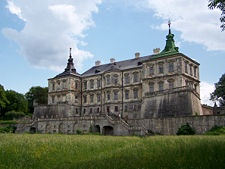 |
Pidhirtsi Castle Pidhirtsi Castle Pidhirtsi Castle is a residential castle-fortress located in the village of Pidhirtsi in Lviv Oblast western Ukraine, located eighty kilometers east of Lviv. It was constructed by Guillaume Le Vasseur de Beauplan between 1635–1640 by order of the Polish-Lithuanian Commonwealth's Grand Crown... |
Pidhirtsi Pidhirtsi Pidhirtsi is a village of about 1000 inhabitants in the Lviv Oblast of Ukraine, located about 80 km east of Lviv, 17 km south of Brody, 60 km north west of Ternopil, at around... |
Stanisław Koniecpolski | |
| City palaces | ||||
| Royal Castle, Warsaw The Royal Castle in Warsaw is a castle residency and was the official residence of the Polish monarchs. It is located in the Castle Square, at the entrance to the Warsaw Old Town. The personal offices of the king and the administrative offices of the Royal Court of Poland were located there from... (rebuilt after destruction) |
Warsaw Warsaw Warsaw is the capital and largest city of Poland. It is located on the Vistula River, roughly from the Baltic Sea and from the Carpathian Mountains. Its population in 2010 was estimated at 1,716,855 residents with a greater metropolitan area of 2,631,902 residents, making Warsaw the 10th most... |
Augustus III of Poland Augustus III of Poland Augustus III, known as the Saxon ; ; also Prince-elector Friedrich August II was the Elector of Saxony in 1733-1763, as Frederick Augustus II , King of Poland and Grand Duke of Lithuania in 1734-1763.-Biography:Augustus was the only legitimate son of Augustus II the Strong, Imperial Prince-Elector... |
||
| (rebuilt after destruction) |
Warsaw Warsaw Warsaw is the capital and largest city of Poland. It is located on the Vistula River, roughly from the Baltic Sea and from the Carpathian Mountains. Its population in 2010 was estimated at 1,716,855 residents with a greater metropolitan area of 2,631,902 residents, making Warsaw the 10th most... |
Jerzy Dominik Lubomirski Jerzy Dominik Lubomirski Prince Jerzy Dominik Lubomirski was a Polish noble .He was the son of Grand Marshal and Hetman Jerzy Sebastian Lubomirski and Barbara Tarło. In 1695 he married Urszula of Altenbockum. The marriage was dissolved by the Pope and c... |
||
| (rebuilt after destruction) |
Warsaw Warsaw Warsaw is the capital and largest city of Poland. It is located on the Vistula River, roughly from the Baltic Sea and from the Carpathian Mountains. Its population in 2010 was estimated at 1,716,855 residents with a greater metropolitan area of 2,631,902 residents, making Warsaw the 10th most... |
Jan Fryderyk Sapieha Jan Fryderyk Sapieha Jan Fryderyk Sapieha was a Grand Recorder of Lithuania between 1706 and 1709, since 1716 – the castellan of Trakai and after 1735 – the Grand Chancellor of Lithuania.... |
||
| Metropolitan Palace Metropolitan Palace, Lviv The Metropolitan Palace opposite St. George's Cathedral, Lviv has been the principal residence of the Metropolitans of the Ukrainian Greek-Catholic Church since the 16th century. The current building was erected in 1761-62 to Clement Fessinger's designs and displays traits of the transition from... |
Lviv Lviv Lviv is a city in western Ukraine. The city is regarded as one of the main cultural centres of today's Ukraine and historically has also been a major Polish and Jewish cultural center, as Poles and Jews were the two main ethnicities of the city until the outbreak of World War II and the following... |
Franciszek Kulczycki | ||
| (rebuilt after destruction) |
Warsaw Warsaw Warsaw is the capital and largest city of Poland. It is located on the Vistula River, roughly from the Baltic Sea and from the Carpathian Mountains. Its population in 2010 was estimated at 1,716,855 residents with a greater metropolitan area of 2,631,902 residents, making Warsaw the 10th most... |
Kajetan Sołtyk | ||
 |
Ostrogski Palace Ostrogski Palace, or Ostrogski Castle , is a mansion in the city center of Warsaw, on ulica Tamka.Begun by the powerful Ostrogski family who gave their name to the building, it currently houses the Fryderyk Chopin Society and Fryderyk Chopin Museum.-History:The spot for the palace, a large lot of... (rebuilt after destruction) |
Warsaw Warsaw Warsaw is the capital and largest city of Poland. It is located on the Vistula River, roughly from the Baltic Sea and from the Carpathian Mountains. Its population in 2010 was estimated at 1,716,855 residents with a greater metropolitan area of 2,631,902 residents, making Warsaw the 10th most... |
Jan Gniński | |
| (rebuilt after destruction) |
Warsaw Warsaw Warsaw is the capital and largest city of Poland. It is located on the Vistula River, roughly from the Baltic Sea and from the Carpathian Mountains. Its population in 2010 was estimated at 1,716,855 residents with a greater metropolitan area of 2,631,902 residents, making Warsaw the 10th most... |
Jan Dobrogost Krasiński Jan Dobrogost Krasinski Jan Dobrogost Bonawentura Krasiński was a Polish nobleman .Jan became a Royal Colonel in 1665, and became Recorder of the Crown and voivode of Płock Voivodeship in 1688. He was also starost of Łomża, Warsaw, Nowe Miasto Korczyn, Przasnysz, Sztum, and Opinogóra Górna.... |
||
| (rebuilt after destruction) |
Warsaw Warsaw Warsaw is the capital and largest city of Poland. It is located on the Vistula River, roughly from the Baltic Sea and from the Carpathian Mountains. Its population in 2010 was estimated at 1,716,855 residents with a greater metropolitan area of 2,631,902 residents, making Warsaw the 10th most... |
Jan Jerzy Przebendowski | ||
| (rebuilt after destruction) |
Warsaw Warsaw Warsaw is the capital and largest city of Poland. It is located on the Vistula River, roughly from the Baltic Sea and from the Carpathian Mountains. Its population in 2010 was estimated at 1,716,855 residents with a greater metropolitan area of 2,631,902 residents, making Warsaw the 10th most... |
Jan Klemens Branicki | ||
| Czapski Palace The Czapski Palace is a substantial palace in the center of Warsaw, at 5 Krakowskie Przedmieście. It is considered one of the most distinguished examples of rococo architecture in Poland's capital.... (rebuilt after destruction) |
Warsaw Warsaw Warsaw is the capital and largest city of Poland. It is located on the Vistula River, roughly from the Baltic Sea and from the Carpathian Mountains. Its population in 2010 was estimated at 1,716,855 residents with a greater metropolitan area of 2,631,902 residents, making Warsaw the 10th most... |
Adam Mikołaj Sieniawski | ||
| Sanguszko Palace | Lubartów Lubartów Lubartów is a town in eastern Poland, with 23,000 inhabitants , situated in Lublin Voivodeship. It is the capital of Lubartów County and the Lubartów Commune.-History:... |
Paweł Karol Sanguszko | ||
 |
New Hrodna Castle The New Castle in Hrodna, Belarus is the royal palace of Augustus III of Poland and Stanisław August Poniatowski where the famous Grodno Sejm took place in 1793.... (destroyed) |
Hrodna Hrodna Grodno or Hrodna , is a city in Belarus. It is located on the Neman River , close to the borders of Poland and Lithuania . It has 327,540 inhabitants... |
Augustus III of Poland Augustus III of Poland Augustus III, known as the Saxon ; ; also Prince-elector Friedrich August II was the Elector of Saxony in 1733-1763, as Frederick Augustus II , King of Poland and Grand Duke of Lithuania in 1734-1763.-Biography:Augustus was the only legitimate son of Augustus II the Strong, Imperial Prince-Elector... |
|
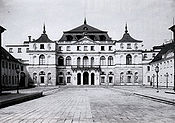 |
Brühl Palace, Warsaw The Brühl Palace , otherwise known as Sandomierski Palace standing at Piłsudski Square. It was a large palace and one of the most beautiful rococo buildings in pre-World War II Warsaw.-History:... (destroyed) |
Warsaw Warsaw Warsaw is the capital and largest city of Poland. It is located on the Vistula River, roughly from the Baltic Sea and from the Carpathian Mountains. Its population in 2010 was estimated at 1,716,855 residents with a greater metropolitan area of 2,631,902 residents, making Warsaw the 10th most... |
Jerzy Ossoliński Jerzy Ossolinski Prince Jerzy Ossoliński was a Polish szlachcic, Crown Court Treasurer from 1632, voivode of Sandomierz from 1636, Reichsfürst since 1634, Crown Deputy Chancellor from 1639, Great Crown Chancellor from 1643, starost of Bydgoszcz , Lubomel , Puck and Bolim , magnate, politician and diplomat... |
|
 |
(destroyed) |
Warsaw Warsaw Warsaw is the capital and largest city of Poland. It is located on the Vistula River, roughly from the Baltic Sea and from the Carpathian Mountains. Its population in 2010 was estimated at 1,716,855 residents with a greater metropolitan area of 2,631,902 residents, making Warsaw the 10th most... |
Augustus II the Strong Augustus II the Strong Frederick Augustus I or Augustus II the Strong was Elector of Saxony and King of Poland and Grand Duke of Lithuania .... |
|
| (rebuilt in neoclassical style) |
Warsaw Warsaw Warsaw is the capital and largest city of Poland. It is located on the Vistula River, roughly from the Baltic Sea and from the Carpathian Mountains. Its population in 2010 was estimated at 1,716,855 residents with a greater metropolitan area of 2,631,902 residents, making Warsaw the 10th most... |
Augustus II the Strong and Anna Karolina Orzelska Anna Karolina Orzelska Anna Karolina Orzelska was an adventuress and Polish szlachcianka , the illegitimate daughter of August II the Strong, Elector of Saxony and King of Poland, by Henriette Rénard.-Life:... |
||
| Kazimierzowski Palace The Kazimierz Palace is a building in Warsaw, Poland, adjacent to the Royal Route, at Krakowskie Przedmieście 26/28.Originally built in 1637-41, it was rebuilt in 1660 for King John II Casimir and again in 1765-68, by Domenico Merlini, for the Corps of Cadets established by King Stanisław August... (rebuilt in neoclassical style) |
Warsaw Warsaw Warsaw is the capital and largest city of Poland. It is located on the Vistula River, roughly from the Baltic Sea and from the Carpathian Mountains. Its population in 2010 was estimated at 1,716,855 residents with a greater metropolitan area of 2,631,902 residents, making Warsaw the 10th most... |
Aleksander Sułkowski | ||
| Pleasure palaces | ||||
| Chinese Palace Zolochiv Castle Zolochiv Castle was a residence of the Sobieski noble family on a hill at the confluence of two small rivers in the south-eastern part of Zolochiv, Galicia .... |
Zolochiv Zolochiv Zolochiv is a town located in the Lviv Oblast of western Ukraine. It is the administrative center of the Zolochiv Raion .... |
John III Sobieski John III Sobieski John III Sobieski was one of the most notable monarchs of the Polish–Lithuanian Commonwealth, from 1674 until his death King of Poland and Grand Duke of Lithuania. Sobieski's 22-year-reign was marked by a period of the Commonwealth's stabilization, much needed after the turmoil of the Deluge and... |
||
| Lubomirski Palace | Rzeszów Rzeszów Rzeszów is a city in southeastern Poland with a population of 179,455 in 2010. It is located on both sides of the Wisłok River, in the heartland of the Sandomierska Valley... |
Jerzy Ignacy Lubomirski | ||
| Harem Harem Harem refers to the sphere of women in what is usually a polygynous household and their enclosed quarters which are forbidden to men... |
Grabki Duże Grabki Duze Grabki Duże is a village in the administrative district of Gmina Szydłów, within Staszów County, Świętokrzyskie Voivodeship, in south-central Poland... |
Stanisław Rupniewski, castellan of Małogoszcz, who converted to Islam | ||
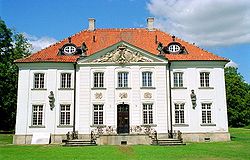 |
Branicki Palace | Choroszcz Choroszcz Choroszcz is a town in north-eastern Poland.It is situated in the Podlaskie Voivodeship , having previously been in Białystok Voivodeship .... |
Jan Klemens Branicki | |
| Old Palace | Ostromecko Ostromecko Ostromecko is a village in the administrative district of Gmina Dąbrowa Chełmińska, within Bydgoszcz County, Kuyavian-Pomeranian Voivodeship, in north-central Poland. It lies south-west of Dąbrowa Chełmińska, east of Bydgoszcz, and north-west of Toruń.... |
Bogdan Makowski | ||
| Orangery | Sieniawa Sieniawa Sieniawa is a town in southeastern Poland. It had a population of 2,127 inhabitants . Since 1999, Sieniawa has been part of Subcarpathian Province.-References:Notes... |
Adam Mikołaj Sieniawski | ||
Russian Empire
| Image | Name | Location | First owner |
|---|---|---|---|
| Peterhof Palace Peterhof Palace The Peterhof Palace in Russian, so German is transliterated as "Петергoф" Petergof into Russian) for "Peter's Court") is actually a series of palaces and gardens located in Saint Petersburg, Russia, laid out on the orders of Peter the Great. These Palaces and gardens are sometimes referred as the... |
Peterhof |
Peter I of Russia Peter I of Russia Peter the Great, Peter I or Pyotr Alexeyevich Romanov Dates indicated by the letters "O.S." are Old Style. All other dates in this article are New Style. ruled the Tsardom of Russia and later the Russian Empire from until his death, jointly ruling before 1696 with his half-brother, Ivan V... |
|
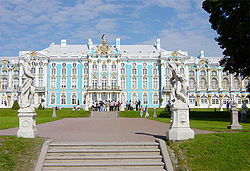 |
Catherine Palace Catherine Palace The Catherine Palace was the Rococo summer residence of the Russian tsars, located in the town of Tsarskoye Selo , 25 km south-east of St. Petersburg, Russia.- History :... |
Pushkin Pushkin (town) Pushkin is a municipal town in Pushkinsky District of the federal city of St. Petersburg, Russia, located south from the center of St. Petersburg proper, and its train station, Detskoye Selo, is directly connected by railway to the Vitebsky Rail Terminal of the city... |
Empress Elisabeth |
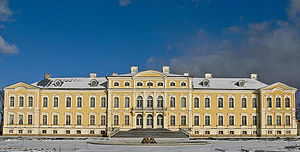 |
Rundāle Palace Rundale Palace Rundāle Palace is one of the two major baroque palaces built in the 18th century for the Dukes of Courland in what is now Latvia, the other being Jelgava Palace. It is situated at Pilsrundāle, 12 km west of Bauska. It was constructed in the 1730s to a design by Bartolomeo Rastrelli as a summer... |
Pilsrundāle |
Ernst Johann von Biron Ernst Johann von Biron Ernst Johann von Biron was a Duke of Courland and Semigallia and regent of the Russian Empire .-Biography:Born as Ernst Johann Biren in Kalnciems, Courland, he was the grandson of a groom in the service of Jacob Kettler, Duke of Courland, who bestowed upon him a small estate, which Biron's... |
| Oranienbaum Palace | Lomonosov Lomonosov, Russia Lomonosov is a municipal town in Petrodvortsovy District of the federal city of St. Petersburg, Russia, situated on the southern coast of the Gulf of Finland, west of St. Petersburg proper. Population:... |
Alexander Menshikov | |
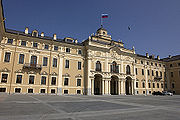 |
Strelna Palace | Strelna Strelna Strelna is a municipal settlement in Petrodvortsovy District of the federal city of St. Petersburg, Russia, situated about halfway between St. Petersburg proper and Petergof and overlooking the shore of the Gulf of Finland... |
Peter I of Russia |
| Vorontsov Palace | Saint Petersburg Saint Petersburg Saint Petersburg is a city and a federal subject of Russia located on the Neva River at the head of the Gulf of Finland on the Baltic Sea... |
Mikhail Illarionovich Vorontsov Mikhail Illarionovich Vorontsov Count Mikhail Illarionovich Vorontsov was a Russian statesman and diplomat, who laid foundations for the fortunes of the Vorontsov family.... |
|
| Catherinethal Palace Kadriorg Palace Catherinethal is a Petrine Baroque palace of Catherine I of Russia in Tallinn, Estonia. It was built after the Great Northern War to Nicola Michetti's designs by Gaetano Chiaveri and Mikhail Zemtsov. In the 20th century the Estonian version of the name, Kadriorg, gained currency and came to be... |
Tallinn Tallinn Tallinn is the capital and largest city of Estonia. It occupies an area of with a population of 414,940. It is situated on the northern coast of the country, on the banks of the Gulf of Finland, south of Helsinki, east of Stockholm and west of Saint Petersburg. Tallinn's Old Town is in the list... |
Peter I of Russia | |
| Kikin Palace Kikin Palace The Kikin Hall is one of the oldest buildings in Saint Petersburg, Russia. The diminutive residence was commissioned by Alexander Kikin in 1714. The name of the architect is unknown, but similarities to the old Peterhof palace abound, suggesting an attribution to Andreas Schlüter.The palace was... |
Saint Petersburg Saint Petersburg Saint Petersburg is a city and a federal subject of Russia located on the Neva River at the head of the Gulf of Finland on the Baltic Sea... |
Alexander Kikin Alexander Kikin Alexander Vasilievich Kikin was a political mentor and advisor to Tsarevich Alexis. Accused of having arranged his flight abroad, Kikin was broken on the wheel.... |
|
| Mariyinsky Palace Mariyinsky Palace Mariyinsky Palace is an official ceremonial residence of the President of Ukraine in Kiev and adjoins the neo-classical building of the Verkhovna Rada of Ukraine... |
Kiev Kiev Kiev or Kyiv is the capital and the largest city of Ukraine, located in the north central part of the country on the Dnieper River. The population as of the 2001 census was 2,611,300. However, higher numbers have been cited in the press.... |
Empress Elisabeth | |
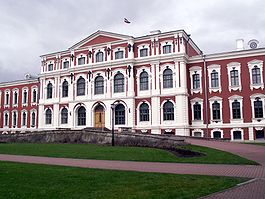 |
Jelgava Palace Jelgava Palace Jelgava Palace or Mitava Palace is the largest Baroque style palace in the Baltic states. It was built in the 18th century based on the design of Bartolomeo Rastrelli as a residence for the Dukes of Courland in their capital - Mitava , Latvia... |
Jelgava Jelgava -Sports:The city's main football team, FK Jelgava, plays in the Latvian Higher League and won the 2009/2010 Latvian Football Cup.- Notable people :*August Johann Gottfried Bielenstein - linguist, folklorist, ethnographer... |
Ernst Johann von Biron |
| Chinese Palace | Lomonosov |
Catherine II of Russia Catherine II of Russia Catherine II, also known as Catherine the Great , Empress of Russia, was born in Stettin, Pomerania, Prussia on as Sophie Friederike Auguste von Anhalt-Zerbst-Dornburg... |
|
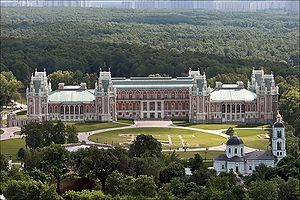 |
Catherine Palace | Moscow Moscow Moscow is the capital, the most populous city, and the most populous federal subject of Russia. The city is a major political, economic, cultural, scientific, religious, financial, educational, and transportation centre of Russia and the continent... |
Catherine II of Russia |
.jpg) |
Winter Palace Winter Palace The Winter Palace in Saint Petersburg, Russia, was, from 1732 to 1917, the official residence of the Russian monarchs. Situated between the Palace Embankment and the Palace Square, adjacent to the site of Peter the Great's original Winter Palace, the present and fourth Winter Palace was built and... |
Saint Petersburg Saint Petersburg Saint Petersburg is a city and a federal subject of Russia located on the Neva River at the head of the Gulf of Finland on the Baltic Sea... |
Empress Elisabeth |
 |
(destroyed) |
Saint Petersburg Saint Petersburg Saint Petersburg is a city and a federal subject of Russia located on the Neva River at the head of the Gulf of Finland on the Baltic Sea... |
Empress Elisabeth |
| Menshikov Palace Menshikov Palace The Menshikov Palace is a Petrine Baroque edifice in Saint Petersburg, situated on Universitetskaya Embankment of the Bolshaya Neva on Vasilyevsky Island. It was the first stone building in the city... |
Saint Petersburg Saint Petersburg Saint Petersburg is a city and a federal subject of Russia located on the Neva River at the head of the Gulf of Finland on the Baltic Sea... |
Alexander Menshikov | |
| Stroganov Palace Stroganov Palace The Stroganov Palace is a Late Baroque palace at the intersection of the Moika River and Nevsky Prospekt in Saint Petersburg, Russia. The palace was built to Bartolomeo Rastrelli's designs for Baron Sergei Grigoriyevich Stroganov in 1753-1754... |
Saint Petersburg Saint Petersburg Saint Petersburg is a city and a federal subject of Russia located on the Neva River at the head of the Gulf of Finland on the Baltic Sea... |
Stroganov family | |
| Sheremetev Palace | Saint Petersburg Saint Petersburg Saint Petersburg is a city and a federal subject of Russia located on the Neva River at the head of the Gulf of Finland on the Baltic Sea... |
Pyotr Sheremetev |
Scandinavia
| Image | Name | Location | First owner | |
|---|---|---|---|---|
 |
Drottningholm Palace Drottningholm Palace The Drottningholm Palace is the private residence of the Swedish royal family. It is located in Drottningholm. It is built on the island Lovön , and is one of Sweden's Royal Palaces. It was originally built in the late 16th century. It served as a residence of the Swedish royal court for most of... |
Drottningholm Drottningholm Drottningholm, literally "Queen's Islet", is a locality situated in Ekerö Municipality, Stockholm County, Sweden, with 410 inhabitants in 2005.... |
Queen Hedvig Eleonora | |
| Fredensborg Palace Fredensborg Palace Fredensborg Palace, , is a palace located on the eastern shore of Lake Esrum in Fredensborg on the island of Zealand in Denmark. It is the Danish Royal Family’s spring and autumn residence, and is often the site of important state visits and events in the Royal Family... |
Fredensborg Fredensborg Fredensborg is a railway town with a population of 8,377 located in Fredensborg Municipality, Denmark at the railroad between Hillerød and Helsingør.... |
Frederick IV of Denmark Frederick IV of Denmark Frederick IV was the king of Denmark and Norway from 1699 until his death. Frederick was the son of King Christian V of Denmark and Norway and Charlotte Amalie of Hesse-Kassel .-Foreign affairs:... |
||
| Frederiksberg Palace Frederiksberg Palace Frederiksberg Palace is a Baroque residence, located in Frederiksberg, Denmark, adjacent to the Copenhagen Zoo. It commands an impressive view over Frederiksberg Park, originally designed as a palace garden in the Baroque style... |
Frederiksberg Frederiksberg Frederiksberg Kommune is a municipality on the island of Zealand in Denmark. It surrounded by the city of Copenhagen. The municipality, co-extensive with its seat, covers an area of and has a total population of 98,782 making it the smallest municipality in Denmark area-wise, the fifth most... |
Frederick IV | ||
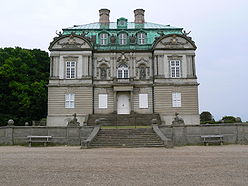 |
Eremitage Palace Eremitage Palace The Eremitage Palace or Eremitage Hunting Lodge is located in Dyrehaven north of Copenhagen, Denmark. The palace was built by architect Lauritz de Thurah in Baroque style from 1734 to 1736 for Christian VI of Denmark in order to host royal banquets during royal hunts in Dyrehaven.- Name :Never... |
Dyrehaven |
Christian VI of Denmark Christian VI of Denmark Christian VI was King of Denmark and Norway from 1730 to 1746.He was the son of King Frederick IV of Denmark and Norway and Louise of Mecklenburg-Güstrow. He married Sophia Magdalen of Brandenburg-Kulmbach and fathered Frederick V.-The reign and personality of Christian VI:To posterity Christian... |
|
| City palaces | ||||
| Gottorf Castle {rebuilt by Tessin) |
Schleswig Schleswig Schleswig or South Jutland is a region covering the area about 60 km north and 70 km south of the border between Germany and Denmark; the territory has been divided between the two countries since 1920, with Northern Schleswig in Denmark and Southern Schleswig in Germany... |
Frederick IV, Duke of Holstein-Gottorp Frederick IV, Duke of Holstein-Gottorp Duke Frederick IV of Holstein-Gottorp was Duke of Schleswig.He was born in Gottorp as the elder son of Duke Christian Albrecht of Holstein-Gottorp and Princess Frederika Amalia of Denmark... |
||
| Stockholm Palace Stockholm Palace The Stockholm Palace is the official residence and major royal palace of the Swedish monarch. . Stockholm Palace is located on Stadsholmen , in Gamla Stan in the capital, Stockholm... |
Stockholm Stockholm Stockholm is the capital and the largest city of Sweden and constitutes the most populated urban area in Scandinavia. Stockholm is the most populous city in Sweden, with a population of 851,155 in the municipality , 1.37 million in the urban area , and around 2.1 million in the metropolitan area... |
Frederick of Sweden | ||
| Amalienborg Palace Amalienborg Palace Amalienborg Palace is the winter home of the Danish royal family, and is located in Copenhagen, Denmark. It consists of four identical classicizing palace façades with rococo interiors around an octagonal courtyard ; in the centre of the square is a monumental equestrian statue of Amalienborg's... |
Copenhagen Copenhagen Copenhagen is the capital and largest city of Denmark, with an urban population of 1,199,224 and a metropolitan population of 1,930,260 . With the completion of the transnational Øresund Bridge in 2000, Copenhagen has become the centre of the increasingly integrating Øresund Region... |
Adam Gottlob Moltke Adam Gottlob Moltke Count Adam Gottlob Moltke , Danish courtier, statesman and diplomat, born at Riesenhof in Mecklenburg.-Early life:... |
||

